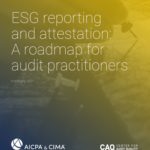The Investor Responsibility Research Center (IRRC) has released its extensive review and analysis of the fees public companies pay to their auditors, which were broken out into fees for audit and non-audit services for the first time last year under new SEC regulations. The Audit/Non-Audit Fee Landscape: Analysis and Benchmarks covers more than 1,200 companies in the S&P 500, S&P MidCap, and S&P SmallCap indexes.
Almost three-quarters of the total fees these companies paid to the accountant that conducted their audit in fiscal 2000 were for non-audit services, according to the new report, which is based on fees reported in proxy statements issued in 2001.
The companies reported paying a total of $5.7 billion to their auditors, of which 72% related to non-audit services, on a weighted average basis. The median proportion of non-audit fees was 61% of total fees paid to the auditor.
The top five companies in terms of the percentage of non-audit fees paid were:
Artic Cat 98% of $6.22 million in aggregate fees to Grant Thorton
Puget Energy 97% of $17.8 million in aggregate fees to PricewaterhouseCoopers (PWC)
Marriott International 97% of $31.33 million in aggregate fees to Andersen
Sprint 96% of $66.3 million in aggregate fees to Ernst & Young (E&Y)
MemberWorks 95% of $3.56 million in aggregate fees to PWC
The study also found wide discrepancies in the fees paid for audits by companies of comparable size. The five companies in the study that paid the most for their audits were:
Waste Management – $48 million (of $79 million in total fees to Andersen)
Citigroup – $26.13 million (of $50.76 million in total fees to KPMG)
Enron – $25 million (of $52 million in total fees to Andersen)
General Electric – $23.9 million (of $103.6 million in total fees to KPMG)
J.P. Morgan Chase – $21.3 million (of $105.5 million in total fees to PWC
Among the companies paying the least for audit services in fiscal 2000 were biotech firms Immune Response ($33,000 to Andersen) and Theragenics ($53,000 to Grant Thorton), along with oil services operator Tetra Technologies ($55,000 to E&Y). Tetra was also among only a handful of companies that reported paying no amounts for non-audit services. Companies paying the highest amounts for non-audit services included General Motors ($77 million, of $96 million total paid to Deloitte & Touche [D&T]); J.P. Morgan Chase ($73.1 million of $105.5 million in total fees to PWC), and Ford Motor ($68.5 million of $87.5 million in total fees to PWC).
For the 2001 proxy season companies had to comply with a variety of new SEC rules that were intended to improve corporate audit committee effectiveness, enhance disclosures about audit committees, and strengthen the reliability of financial statements. The intent of the new disclosure rule, which was enacted in lieu of banning non-audit services altogether, was to give investors adequate information of the intricate relationships between companies and their auditors. Worries about the quality of auditor, illustrated most recently in the Enron implosion, have stemmed primarily from fear that the non-audit relationships may impair independence, especially when non-audit fees significantly exceed the amount paid for auditing services.
The disclosure rules apply to all U.S. public companies filing proxy statements on or after Feb. 5, 2001, for meetings at which directors will be elected. Specifically, each proxy statement must stipulate the fees paid to the company’s independent public accountant during the last fiscal year. The fees for audit and non-audit services must be broken out for three categories.
Audit FeesThe aggregate fees billed for professional services rendered for the audit of the company’s annual financial statements for the most recent fiscal year and the reviews of the financial statements included in the company’s forms 10Q filings.
Financial Information Systems Design and Implementation FeesThe aggregate fees billed for information technology services.
All Other FeesThe aggregate fees billed for all other services, including tax, valuation, actuarial and other expert services.
Based on the disclosure guidelines, IRRC found that, overall, only 28 percent of the reported fees paid to auditors by 1,224 companies represented payments for audit services, while 72 percent of the total fees were paid for non-audit services (including about 12 percent for information technology services and 60 percent for all other services).
Breakdown of Fees to Audit Companies:
Type of service Audit services Financial information systems All other services
Percent of total fees 28 12 60
The accounting firm that earned the largest proportion of its fees for non-audit services was PWC (76%), while the lowest average, 57%, was shared among non-"big five" firms generally. Andersen, which has come under increasing fire for questionable audits in recent years, culminating in the Enron debacle, earned 68% of its total fees from these companies for performing non-audit services.
IRRC also determined that companies that paid 75 percent or more of aggregate fees for non-audit services tended to pay below average audit fees relative to their peers of similar size. The Audit/Non-Audit Fee Landscape study shows average and median benchmarks for 16 peer groups, based on a combination of business class (industrial or service) and revenue band.
Under the new rules, companies must also disclose whether their audit committee considered if the provision of non-audit services, including information technology services, was compatible with maintaining the auditor’s independence. Companies are not required to disclose the audit committee’s conclusions, however. Most companies that IRRC reviewed did not discuss the audit committee’s findings.
IRRC is the leading source of impartial, independent research on corporate governance, proxy voting and corporate responsibility issues. Founded in 1972, IRRC has more than 70 professional staff members providing research, analysis, software and consulting services to a wide range of clients, including institutional investors, corporations and law firms. IRRC offers guidance and advice on proxy voting, enabling clients to make informed, considered decisions that reflect their investment philosophies.



